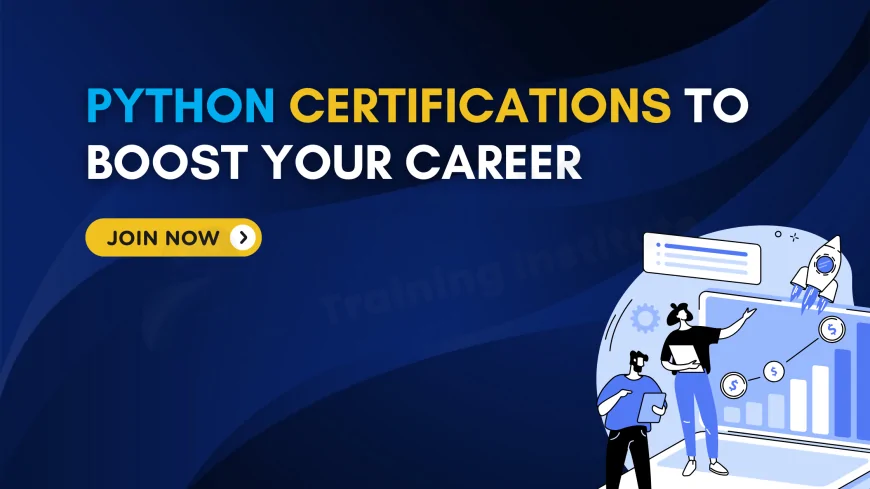Top Python Certification Exams in 2025 | Boost Your Programming Career with the Right Credential
Explore the best Python certification exams to enhance your programming skills and career prospects. Learn about beginner to advanced level certifications, exam tips, and how Python training institutes in Pune can help you prepare.

Picture this: you’ve just completed a Python course. You've memorized the syntax, written a few "Hello, World!" programs, maybe even created a basic calculator. Yet, when it’s time to solve a real-world problem—whether it’s automating data entry, building a web scraper, or analyzing large datasets—you’re stuck.
That’s the problem with many Python courses today. They focus on theory but miss out on practical applications. The true power of Python lies in what you can do with it—not just knowing the language, but applying it to real-world scenarios across industries. In this blog, we'll explore Python courses that break the mold by prioritizing hands-on experience and project-based learning.
Why Practical Application Matters in Python Learning
1. Retention Through Real Work
-
Students retain more information when they apply concepts in real-time.
-
Practice-oriented courses help solidify abstract ideas into tangible skills.
2. Job-Ready Skills
-
Employers don’t hire based on theory—they look for skills that solve problems.
-
Courses with real-world projects help you build a job-ready portfolio.
3. Confidence Building
-
Working on actual problems boosts your confidence and prepares you for interviews.
-
Debugging real issues is the best way to learn troubleshooting—a vital dev skill.
Key Features of Practical Python Courses
1. Project-Based Curriculum
Courses structured around end-to-end projects:
-
Web development projects using Flask or Django
-
Data analysis using Pandas, NumPy, and Matplotlib
-
Automation scripts for Excel, file handling, and web scraping
2. Real-World Use Cases
Focused on industry-relevant applications:
-
Creating dashboards for business intelligence
-
Developing chatbots using NLP libraries
-
Building recommendation engines
3. Integrated Tools and Libraries
Students work with the tools used in real jobs:
-
APIs for integrating external services
-
Git/GitHub for version control
-
Jupyter Notebooks for data analysis
4. Problem Solving and Debugging
Instead of just writing perfect code, students learn to:
-
Break down complex problems
-
Identify bugs and performance bottlenecks
-
Collaborate in team-based environments
Types of Practical Python Courses You Should Look For
1. Data Science-Focused Courses
What they teach:
-
Data cleaning and transformation
-
Exploratory Data Analysis (EDA)
-
Machine learning algorithms using Scikit-Learn
Why it matters:
-
Data is the new oil, and Python is the pipeline.
-
Practical data science skills are crucial in fields like marketing, finance, and healthcare.
2. Automation and Scripting Courses
What they teach:
-
Automating Excel reports
-
Writing custom scripts for file handling
-
Web scraping with BeautifulSoup and Selenium
Why it matters:
-
Time-saving scripts increase productivity.
-
These skills are useful for non-developers too.
3. Web Development with Python
What they teach:
-
Backend frameworks like Django or Flask
-
Creating REST APIs
-
Deploying web apps on cloud platforms
Why it matters:
-
Build and showcase real web apps.
-
You learn software deployment—an essential job skill.
4. Game Development and GUI Applications
What they teach:
-
Building games with Pygame
-
GUI tools like Tkinter and Kivy
Why it matters:
-
Great for learning logic and user interface design.
-
Enhances problem-solving through interactive programs.
5. AI and Machine Learning Courses
What they teach:
-
Supervised and unsupervised learning
-
Neural networks using TensorFlow or PyTorch
-
Natural Language Processing (NLP)
Why it matters:
-
Prepares you for high-growth fields like AI and robotics.
-
Real projects like chatbots and image classifiers solidify concepts.
Key Concepts That Practical Courses Cover
1. Version Control Systems
-
Using Git for tracking changes
-
Collaborative workflows with GitHub
2. Testing and Debugging
-
Writing test cases using
unittestandpytest -
Using debuggers to trace bugs
3. Software Architecture
-
Understanding modularity
-
Writing scalable and maintainable code
4. Agile Methodologies
-
Working in sprints
-
Using tools like Trello or Jira to manage projects
5. APIs and Integrations
-
Working with third-party APIs
-
JSON and REST principles
Benefits of Taking Practical Python Courses
1. Build a Portfolio
-
Real-world projects that can be showcased to potential employers
2. Improve Problem-Solving
-
Exposure to a wide variety of challenges strengthens your thinking
3. Cross-Disciplinary Skills
-
Combine Python with your domain: finance, bioinformatics, marketing, etc.
4. Networking and Collaboration
-
Team projects simulate real work environments
-
Some platforms offer community support and mentorship
5. Faster Career Transition
-
Practical skills help career changers get up to speed quickly
Sample Projects You Might Work On
-
Web Scraper for E-commerce Price Comparison
-
Automated Resume Filter Using NLP
-
COVID-19 Dashboard with Live Data
-
Inventory Management System for Small Businesses
-
Personal Finance Tracker using Pandas and Plotly
-
Email Automation for Marketing Campaigns
-
Sentiment Analysis Tool for Twitter Data
-
Face Detection App Using OpenCV
How to Identify a Good Practical Python Course
Reviews and Testimonials
-
Check if past students mention real-world learning
Project Portfolio Mentioned
-
A good course will showcase sample student projects
Tool Integration
-
Ensure the course uses industry tools like Git, APIs, cloud platforms
Structured Curriculum
-
Should progress from basics to intermediate and advanced
Real Instructors
-
Practicing professionals often bring better real-world insights
Common Mistakes to Avoid When Choosing a Course
Prioritizing Cost Over Content
-
Cheap isn’t always good; focus on value
Ignoring the Curriculum Depth
-
Avoid courses that only teach syntax without real application
No Hands-on Assignments
-
Theory-heavy courses with no assignments are red flags
Skipping Feedback Mechanisms
-
Courses without feedback or code reviews won’t help you grow
Career Paths That Value Practical Python Skills
-
Data Analyst
-
Machine Learning Engineer
-
DevOps Engineer
-
Web Developer
-
Automation Tester
-
Cybersecurity Analyst
FAQ's
What are the best certification exams for Python programming?
Popular certifications include PCEP (Certified Entry-Level Python Programmer), PCAP (Certified Associate in Python Programming), and Microsoft’s Python Certification. Python Training Institutes in Pune prepare students for these through hands-on courses, mock exams, and project-based learning.
Is a Python certification necessary for getting a job?
While not mandatory, a certification can give you a competitive edge. Recruiters in Pune’s tech sector often look for certified professionals as it assures validated skills. It complements your resume and boosts your credibility in interviews.
How long does it take to prepare for a Python certification?
Preparation time varies, but typically ranges from 6 to 12 weeks. Training institutes in Pune offer intensive courses with regular practice sessions and real-world projects to ensure comprehensive preparation.
Are there beginner-friendly Python certification exams?
Yes, the PCEP certification is ideal for beginners. Python Training Courses in Pune cover basics like variables, loops, and functions, helping new learners build a strong foundation for this entry-level exam.
Can I get Python certified online through a Pune institute?
Absolutely. Many Python institutes in Pune offer online certification prep courses, complete with live classes, assignments, quizzes, and certification guidance, making it accessible for remote learners.
Which Python certification is best for data science careers?
PCAP or certifications aligned with libraries like NumPy, Pandas, and Scikit-learn are ideal. Pune-based Python courses often bundle these topics with real-time projects to help data science aspirants excel.
What is the cost of Python certification training in Pune?
Costs vary by course depth and mode (online/offline). On average, training programs range between INR 10,000 to INR 25,000. Many institutes offer EMI options and placement support as part of the course.
Are Python certification exams difficult?
The difficulty depends on the level—PCEP is basic, while PCAP and beyond require deeper understanding. Python training in Pune is designed to gradually build skills through exercises and real-time applications, easing exam difficulty.
What kind of jobs can I get with a Python certification?
Python certifications can lead to roles like Python Developer, Data Analyst, Web Developer, and Automation Engineer. In Pune’s IT market, certified candidates often receive higher preference during hiring.
Does a Python certification help with career switching?
Yes, Python is beginner-friendly and widely used in various fields. Python institutes in Pune offer career-focused programs with internships and mentorship to help individuals transition smoothly into tech roles.
Is hands-on experience necessary for certification exams?
Absolutely. Certification exams often include logic-based and real-code problems. Pune training centers ensure students gain hands-on experience through projects, lab work, and coding challenges.
Which skills should I master for Python certification exams?
Key skills include data types, loops, functions, error handling, file I/O, and object-oriented programming. Institutes in Pune reinforce these through structured modules and real-life use-case training.
Do certification programs include placement support?
Yes, many Python training programs in Pune offer placement assistance, resume building, and interview preparation along with certification training, increasing your job-readiness and employment chances.
Are weekend classes available for working professionals?
Yes, flexible batch timings including weekend and evening sessions are available at most Python institutes in Pune, making it easier for working professionals to earn their certification.
What is the passing score for Python certification exams?
The passing score varies by certification body, but typically ranges from 70% to 80%. Training institutes help students with mock tests and personalized feedback to improve their scores.
What study resources are provided in Python certification courses?
Courses usually include video lectures, eBooks, coding exercises, real-time projects, mock exams, and access to discussion forums. Pune-based training providers also offer mentor support for doubt resolution.
Can I retake the certification exam if I fail?
Yes, you can retake most certification exams. However, there might be a waiting period or additional cost. Institutes in Pune often provide free or discounted retry support and post-failure guidance.
How are Python certification exams conducted?
Most certification exams are proctored online or taken at designated test centers. Python training courses in Pune guide students through the registration and test-taking process to reduce exam-day stress.
What is the difference between PCAP and PCEP certifications?
PCEP is for beginners and focuses on fundamental syntax, while PCAP dives into more advanced topics like OOP, data structures, and Python libraries. Courses in Pune help you bridge the gap between the two.
Is a Python certification useful for freelancing opportunities?
Yes, certified Python developers often find better freelance gigs, especially in web development, automation, and data analysis. Pune’s training courses prepare students for both job markets and freelancing platforms.
Learn by Doing, Not Just Watching
The best Python courses go beyond syntax—they immerse you in the kind of projects and tools you’ll use in the real world. Whether you’re analyzing data, building web apps, or automating workflows, practical learning is the bridge between knowledge and action.
If your goal is to use Python to solve real-world problems, then choose a course that challenges you with practical applications, not just quizzes and videos. The skills you build today are the foundation for the career you want tomorrow.
Stay curious. Stay hands-on. Keep coding.
What's Your Reaction?
 Like
0
Like
0
 Dislike
0
Dislike
0
 Love
0
Love
0
 Funny
0
Funny
0
 Angry
0
Angry
0
 Sad
0
Sad
0
 Wow
0
Wow
0















